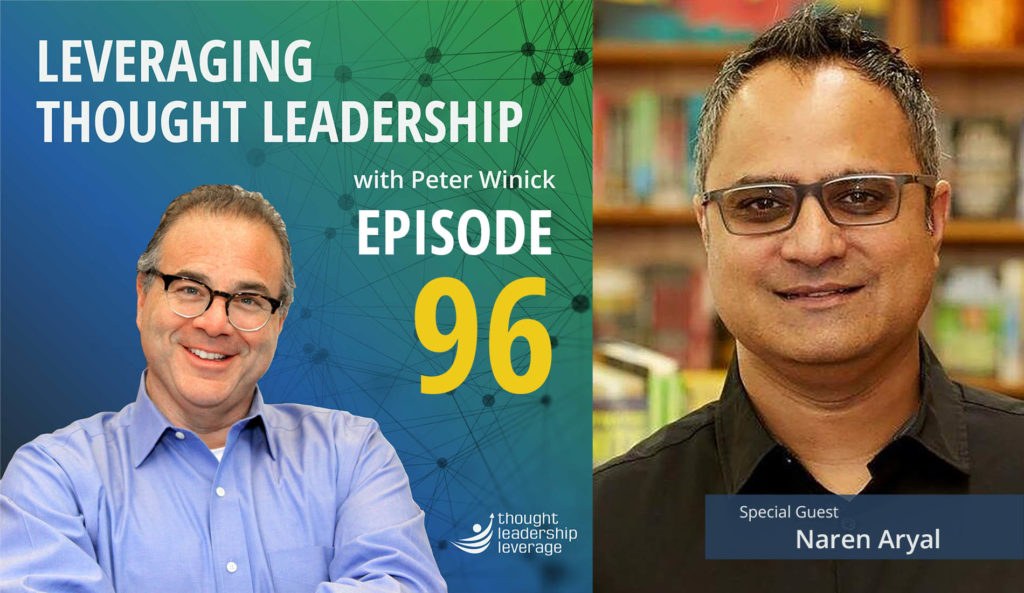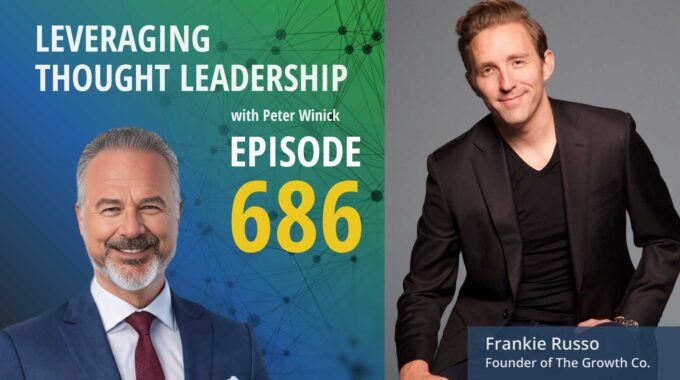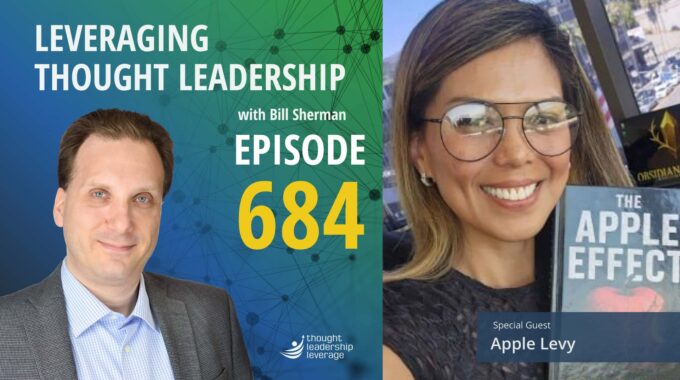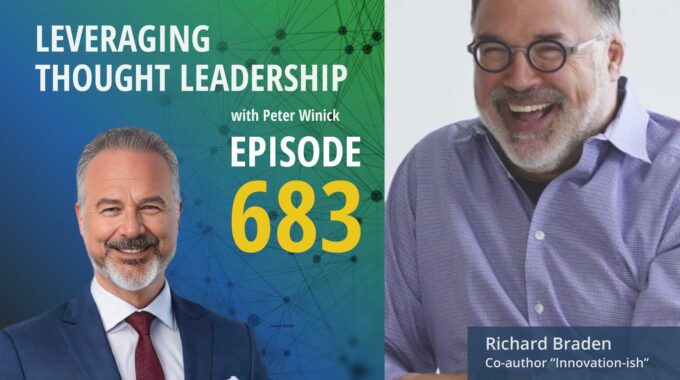How “collective genius” drives continuous growth. This episode shows how to scale thought leadership beyond…
Leveraging Thought Leadership With Peter Winick – Episode 96 – Naren Aryal

Thinking about writing a business book? Before you put pen to paper, you should already be thinking about ways to find and target your best market, and determining which publishing pathways are right for you. Want to learn more?
Naren Aryal, CEO of Mascot Books and Amplify Publishing, and author of “How to Sell a Crapload of Books,” sits down with Peter to share expertise in the fastest growing publishing method today: Hybrid!
In this podcast, Naren explains hybrid publishing and discusses how it is different from the more “traditional” publishing style. If you are interested in a high-quality book with wide distribution that can broadly reach your target audience, you might consider the hybrid approach. Naren gives details on the advantages of hybrid publishing, and why the cultivation of an author’s platform should be started long before the book is published.
If you need a strategy to bring your thought leadership to market, Thought Leadership Leverage can assist you! Contact us for more information. In addition, we can help you implement marketing, research, and sales. Let us help you so you can devote yourself to what you do best.

Transcript
Peter Winick And welcome, welcome, this is Peter Winick. I’m the founder and CEO of Thought Leadership Leverage and you’re joining us on our podcast today, which is Leveraging Thought Leadership. And today my guest is a new friend, Naren Aryal. We got introduced to each other recently through a mutual friend, and he is the co-founder and publisher of Mascot Books and Amplify Publishing. He started his career as a Washington lawyer, but we won’t hold that against him. He’s also an author himself. So his book was called, how to sell a crapload of books. 10 Secrets of a Killer Author Marketing Platform. So obviously we’re gonna talk a lot about publishing and all the fun stuff behind there. So thanks for jumping on today, Naren. I appreciate it.
Naren Aryal Absolutely, Peter. It’s great to be here.
Peter Winick And anytime I get to talk to a lawyer that’s not practicing law, I think we’re doing something good for the planet.
Naren Aryal You had to bring that up, didn’t you?
Peter Winick Recovering lawyer cool. So, you know, you’ve got sort of both sides of this obviously an author But you know your primary focus is on the publishing side I find from my work with a variety of authors and thought leaders and speakers that there are incredibly smart people that are incredibly Confused misinformed baffled etc when it comes to navigating sort of the murky waters of publishing So can you clarify everything they might be concerned about in 30 seconds? What are the things, so if I’m thinking about writing a book, right? So if I am a consultant, I’m a CEO, I’m, you know, I am thought leader. What are some things I should be considering? What should I be thinking about? As opposed to starting with the book. And I would, let me tee it up with, the first thing you start with is not the cover of the book, right?
Naren Aryal That’s right. And so I tell authors all the time, when you start thinking about your book, when you put pen to paper, you should already be thinking about target market and publishing pathways. And just at the highest level, I think when we talk publishing, there’s two ends of that spectrum. On one hand, you have something called pure self-publishing, where that involves uploading your content on Amazon CreateSpace. And there you go. You are a published author by this evening. On the other hand, there is traditional publishing, which requires you have an agent, the agent then will work to a large publishing house, typically in New York, and that of course is called traditional publishing. Where we reside at Mascot and Amplify Publishing is the space in between, which is called hybrid publishing. And what is some of the pros and cons to hybrid publishing, I like to think mostly pros are we produce what I call New York quality books, excellent quality. thorough distribution and effective marketing. So we’re in the space in between the two ends of the spectrum.
Peter Winick And by the way, that space is the fastest growing space in the business, right? So the New York publishing houses, many of them are struggling, right, unless you’re Michelle Obama, it’s hard for them to figure out how to market a book for lots of reasons which we don’t need to dive deep on. And then on the create space side, you know, quite frankly, there are some decent things that come out of there. But more often than not, it is a lot of noise, it a lot crap, there is not a lot quality coming out of this. So to recap, and I think this is the educational piece here. You know, if you were to put down one of your books on the table next to a Simon and Schuster McGraw-Hill, whatever, no one’s going to tell the difference. So the quality is identical. And that is from an editorial perspective as well. There’s no typos. It’s clean. It’s neat. It’s professional. I think people do have a sense of, oh, well, my uncle self-published something 18 years ago and it was, you know, cockeyed and whatever. But quality is not the issue. I would argue that a lot of the differentiators are around the business model, around the investments. around control, both creatively and financially. And what would you say are some of the reasons why your clients are leaning in to your hybrid model versus going either the other two ends of the continuum that you spelled out?
Naren Aryal Yeah, sure. So initially I would say the traditional approach is not necessarily right for everybody. The traditional houses are looking for people with massive, massive platforms. You have to have a platform, but you may not have a massive platform. But you still might have something very important to say in your lane, in your area of expertise. And so if you’re interested in a high-quality book, and thank you, by the way, for emphasizing that, our books and those other publishing houses that play in the hybrid space, they have a high quality book package feel editorial. If that’s important to you, and if distribution is important to, getting it to where it needs to be to reach your target audience, and marketing assistance, all those things are important to. Then I think the hybrid approach is something that you should consider. In terms of the highest level business, the structure, while there are some production related costs that the authors bear in on the front end, the back relative structure is flipped. In other words, we keep the smaller distribution fee, which is typically 15%, and our author, as they have contributed to the production, they will get the larger 85% share. on sale.
Peter Winick So I want to drill down on that because this is where a lot of people don’t understand the finances. Right. So there’s the myth of I’m going to go to an agent and they’re going to run around to the New York houses and I’m gonna get a $300,000 advance. Now we could probably both name the list of 50 or 100 people that that would be true to, but it’s not for most people. Right. And you’ve got to have a built-in audience. It’s not your first time out of the gate. And there’s several other criteria that would make that big, right.
Naren Aryal Yeah, for sure. There’s a lot of good content that isn’t seeing the light of day because people still have that view.
Peter Winick So I look at it as a cashflow issue. So even if you recalibrate, and for some reason, and I’m seeing authors that have track records and all kinds of great histories getting ridiculous advance offers from the big houses. I just had a client where they’ve got, it’s a 50 or $60,000 advance, which isn’t terrible, but then embedded in the contract is, oh wait, and you have to buy X number of units of books for us at wholesale each year for the next three years, and you do a quick back of the envelope of that, it’s like. wait, you’re liable for 200 K like that math doesn’t work. There’s some weird things happening in big publishing. So I think one is be cautious and know what you’re signing and know, you know, is that money upfront really yours? Or did you just take 60 K to have a liability of 200 down the road? The other piece, and I think this is where I want to get your take on is I think that folks that haven’t gone down the traditional publishing or any publishing route yet have this misconception that the publisher air quotes, they take care of everything. All I have to do is write great content and because they’re New York publishers, I’ll be on the Today Show and I’ll be smoking a pipe and you know, life will be grand, it’ll be lovely. So talk about the responsibility of marketing as it relates to the market that we’re in today.
Naren Aryal whether your book is published by Simon and Schuster, you do it on CreateSpace, or you work with Amplify Publishing, the author must be engaged. Because after all, the author knows the subject matter and is the domain expert. More so than I am, you know, in industries other than professional publishing, of course. And so the author most be engaged, and because of that, and you mentioned this earlier, unless you are Michelle Obama, Her publisher is going to roll out the red carpet for her and do everything possible for her. Most authors that that go the traditional route, they don’t have that luxury. They don’t have that level of resources coming from the publisher. And so that is kind of a surprise to some folks. And when you really dig down and talk to authors about what they’re trying to accomplish and how much they want to spend in marketing in terms of time spending in marketing, you know, even traditional, the traditional path isn’t always the right path.
Peter Winick Well, I think people also don’t understand on either path, they’re going to have a liability in terms of the cost and the expenditures. Because even if you did get the New York publishing deal, again, unless you’re Michelle Obama, right, they’re not going to invest in the book at the level that you need to, right? They might invest after the fact once they see some momentum, once they see some traction, but they’re not going put a big marketing campaign behind the 87th Leadership book that they’re putting out that year. They’re just not.
Naren Aryal And those authors are also hiring book publicists and book marketing firms as well.
Peter Winick Exactly so and then the other side is on the business model if You know you get that deal from the New York publisher You’re now the SVP of sales and marketing for your book, and then it starts to sell You’re getting 15 20 cents on the dollar and your quote partner the publisher is getting 80 cents on The Dollar that doesn’t smell like a great partnership to me when you’re both creating the content and Largely not exclusively but largely responsible for the marketing and your model as in most hybrid models It’s sort of flat every everyone’s a little bit different But it sort of flipped or if I’m going to sell the book to my database and through my speeder So all that sort of stuff I’m gonna keep the lion’s share of the return because I’m doing the lion share of work seems a little more equitable
Naren Aryal Yeah. And, you know, we all have friends in the biggest houses in New York. And I will say this on the acquisition side, sometimes they’re a little lazy. They’ll just look for the home runs and sure, you know, it does make sense, right? But for everybody else who’s going to have to be really involved and engaged and in the marketing trenches, it may not be the right answer. And so, you know, I have these discussions with authors all the time.
Peter Winick So let’s talk about, you know, let’s say someone out there, and I’m sure there are folks out there thinking about writing a book. Maybe I won’t run a cup. I wrote one several years ago that did fairly well, but I’m pondering it again. What are the must-haves? So forget the content for a minute that I need to be thinking about and developing in order to increase the probability of that book being successful, be that building my social media presence, be building relationships with other authors, a couple of nuggets that you would throw at us to ponder.
Naren Aryal Sure. So everyone’s heard the term platform and you cannot overstate the importance of platform. And what does a platform mean? It’s friends of the author. It’s LinkedIn folks that know the author, that read their work. It is the world that they have cultivated because of their thought leadership. And so everything has to revolve around the author’s platform and. The cultivation of the platform, the enhancing of the platform must begin early on in the process.
Peter Winick And early on might mean book minus two to three years, right? Like it’s never too early.
Naren Aryal Absolutely. I mean, if you’re not thinking about these times, about marketing, when you’re writing the book or when you work with a ghostwriter, it’s almost too late.
Peter Winick Yeah, exactly.
Naren Aryal If I could just jump in, Peter, you did mention something about how early the platform building begins. One of the things of the Hydro approach that is interesting and appealing is the speed market. Yep. And so if you’re going through a New York house, you’re looking at 18 to 24 months on the low end in terms of time it takes to hit the market, whereas under our model, we can be on market in as little as six months, and it’s usually between six months and a year. Big difference.
Peter Winick Well, in that 18 to 24 months, the other piece is you have less control both editorially as well as release time. I mean, you don’t want your book coming out the same day as Malcolm Gladwell. That’s probably not a good idea. So you have, I call it sort of just the general control. You can release content. You know, if you’re going down a model like yours, you can release some of the content in the book a couple months before in blog forms, other forms, whatever, cause it’s yours. You own it.
Naren Aryal ancillary rights.
Peter Winick You’re going to get a nasty email or phone call from your editor at Random House. If you start releasing things in chapter three, four months before it’s out in the marketplace, they’re not going to think too highly of that. So anyway, so let’s move beyond books for a moment, because this has been great. But talk to me from your experience about clients that you’ve worked with where the book is really sort of a way to do X whatever, you know, increase their visibility, develop a business around it, talk a little bit about the, you No. What’s the power of a book in certain businesses and certain entrepreneurs?
Naren Aryal Sure. It’s, um, you know, I love working with authors where the book is a piece of the platform, right? Uh, they’re not looking at the book, uh, in terms of an ROI in terms of how much they spent on the book versus how much, uh they get back in book sales that that’s just a piece. The other pieces are speaking engagements, opportunities that arise because somebody learns about your content. And those are the biggest wins. And we work with CEOs that use their books to business develop, obviously, right? We’re working on a really fascinating book about AI right now, and it’s going to come out here shortly, where this guy is an expert in the world of AI, a topic that people are talking about a lot these days. And because of it, his company is going to get more visibility and more business. So there’s a lot of things to write a book that go beyond just the selling of a book itself.
Peter Winick And again, the time to think about that is before, because one of the things that I see folks do, which I think is a mistake, is, okay, so let me put all my energy in the book, and then the book comes out and they’re very linear. And then after the book comes out, now I’m going to start to think of other things that may be derivative solutions, or how else I can monetize it. You’ve got to be thinking about those things simultaneously, because I think, and you mentioned earlier, who are you writing this for? Is there an avatar of, you know, if you’re a leadership book, it can’t be for all leaders, you know. Your example of the AI person, that’s a fairly new space. He can go out there shortly and say, I’m the guy that wrote the book on AI, or one of the books, right? I am, my thought leadership in this space is codified in a book. Why don’t you take a look at that? And by the way, here’s the five things that we do is whatever the business that he’s in. If you’d like to talk about that, happy to do that.
Naren Aryal Yeah, in that book, by the way, I’ll go ahead and plug it. It’s called The Age of Intent, Using Artificial Intelligence to Deliver a Superior Customer Experience. And it’s by the CEO of 247.ai, his name is P.V. Cannon. And he’s one of the guys that have really revolutionized the space. And we’re already starting to field inquiries about when this book is coming out, how we can get them to speak and so on.
Peter Winick Right, which is great, because that’s a combination of timing, right? Hot topic, someone that’s got the credentials, because if I wrote that book, no one would read it. Why would they listen to me? But guy in the right place at the right time, but moving quickly. Because if he went again to a New York house, that might not come out for 18 months. And by then two or three others.
Naren Aryal It was much different by that time.
Peter Winick Yeah, exactly. Particularly with technologies that move so quickly or things that are getting a lot of tension now, et cetera. So cool. As, as we start to, uh, get ready to close out in a couple of minutes here, other thoughts, you know, throw out some things that people that you see people do that you wish they wouldn’t do and things that you would ask them to consider doing as they’re going down this, this journey of authorship.
Naren Aryal Sure, so I speak to authors on a daily basis, and I love it when they say, I’ve got this book that everyone is gonna love.
Peter Winick Oh, my worst nightmare.
Naren Aryal And I’ve not yet said this in response yet, but of course, I’m always thinking of it when I hear that I immediately think well that means no one’s gonna love it. Know your target market is the point there
Peter Winick Yeah, and know it with a high level of specificity, right? So the fact that, you know, I get that too. Oh, everyone would appreciate this book. And I’m like, unless you’re Coca-Cola with the billion dollar marketing budget, that ain’t gonna work, right. So I’d rather hear someone say, I’ve got a great leadership book for, you know whatever, Gen Xers, you know managing millennials in the tech world. Like, oh, okay, I can see that. I know where to find those people as a marketer.
Naren Aryal Yeah. And then the other piece of advice I’ll give is like, you know, what are the hot topics right now? And so I mentioned AI, um, another book that we just published is called brainwashed and it’s about the science behind CTE and football by a professional football player, Meryl Hodge. And so CTE, uh, this brain disease is in the meat. Your story’s about it every day, right? And, and so like, you know obviously if you put a well written, well researched book into the market, on CT, it’s going to do well, and you know, that’s been the case with brainwashed, even though we’re taking a contrarian view of this topic that is out there. So that’s another thing. You know, not just about your content, but what’s the discussion going on right now in a particular field.
Peter Winick What I would add to what you said, Narin, is why would anyone listen to you? The fact that this is written by a former NFL football player would be different than, you know, it was written by a medical doctor or just a journalist or layman, right? So there’s someone that’s got, it’s been in the game that, you know, their perspective would be more intriguing than mine would on the topic.
Naren Aryal Yeah, and you know, one more example, if I could, right? I mean, personal finance folks and wealth advisor, they’re notorious, or I shouldn’t say notorious, but they’re prolific book creation. And so we have one guy that wrote that same book that’s been written before, but he knows his target market. He’s in Silicon Valley, and he decided to target his book, which is called Personal Finance for Tech Professionals in Silicon valley and beyond, right. Now that is an outstanding assessment of, you know, who he is writing.
Peter Winick Exactly and I would imagine you know someone like that just by the title and the way it’s positioned if I don’t meet those criteria I wouldn’t buy the book and he only cares about you buying the book to ultimately be aware of his firm and potentially become a Client bingo perfect great. Well, this has been really awesome I appreciate your perspective and your take on this because you’re in the trenches every day as am I and have been Doing this for quite some time and are on the cutting edge of what’s working or not So thanks so much for sharing everything with us and I appreciate it. This is great
Naren Aryal Thank you. Thank you so much.
Peter Winick To learn more about thought leadership leverage, please visit our website at ThoughtLeadershipLeverage.com. To reach me directly, feel free to email me at peter at Thought Leadership Leverage dot com and please subscribe to leveraging thought leadership on iTunes or your favorite podcast app to get your weekly episode automatically.





